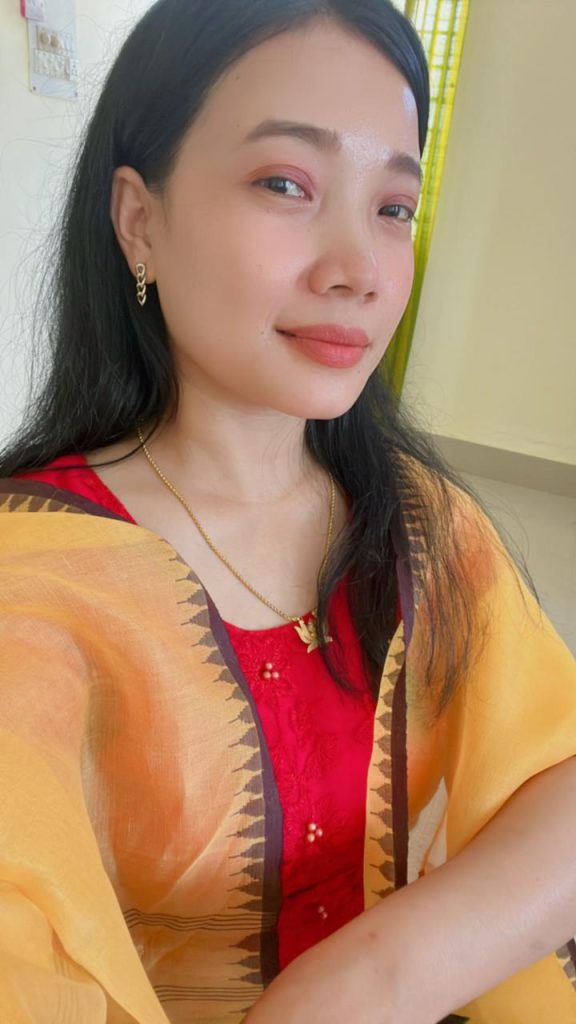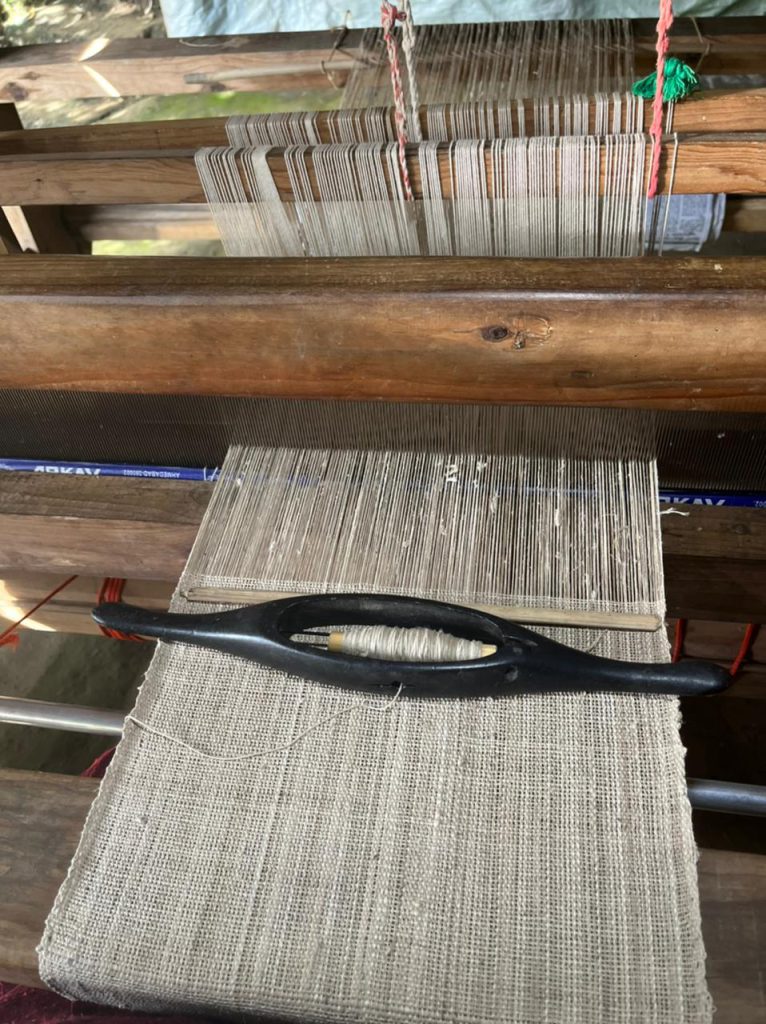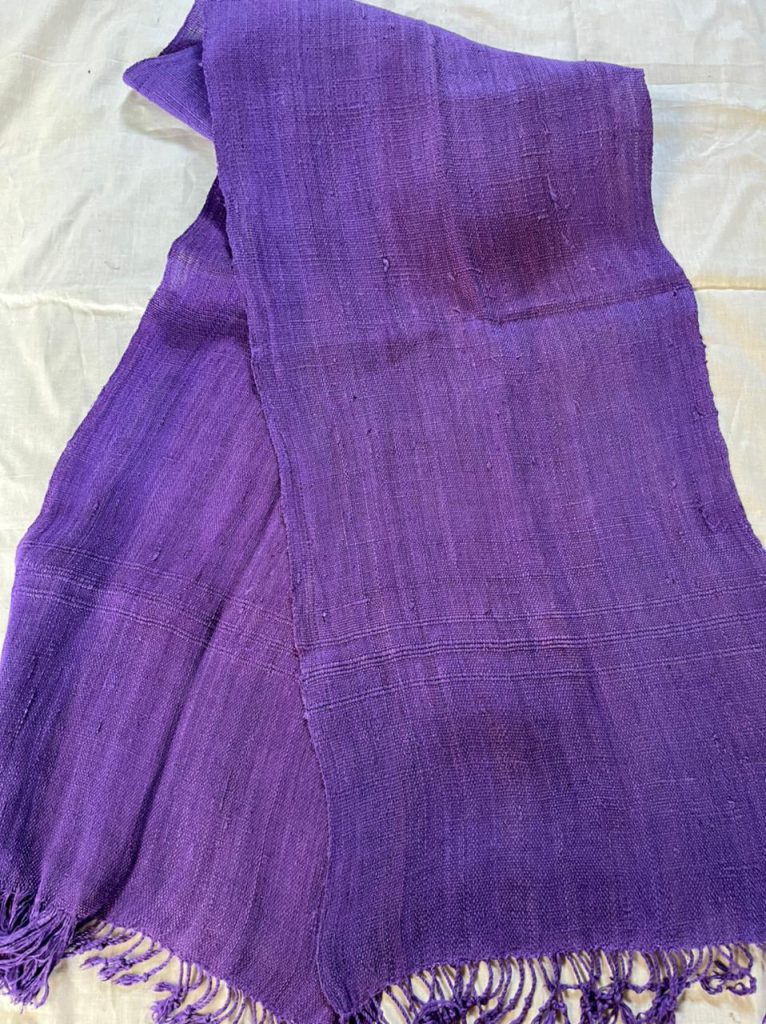Spread the love
Bijiyashanti Tongbram from Manipur prepares clothing made out of exquisite silk products from lotus flowers.
Being brought up into an Assamese family, I have witnessed people around me prepare silk out of silkworms. I was often fascinated at the fact how wonderful the product seemed after. But as I gradually grew up, I started realizing, these clothes made out of silk on which we do not get tired of gazing on are prepared by living organisms. It made me question myself, don't these organisms deserve to live and is it fair just to sacrifice them for our needs?
It was recently when I discovered about silk extractions that contained no animal cruelty.
In Manipur's Bishnupur district, in a little village called Thanga Tongbram, Bijiyashanti Tongbram sits extracting silky-soft fibre from the lotus stems and turning it into thread. She has mastered the delicate art of making lotus fiber.

After earning a Degree with honours in Botany from GP Women's College in Imphal in 2014, Bijiyashanti was still unsure what to do with her knowledge of the plants. Neither could she find a job of her interest.
The following years were spent trying to develop a business strategy whereby she could make money and even generate employment for others.
Her turning point came in 2018 when she participated in a workshop on "How to Become an Entrepreneur" at the Manipur Ministry of Micro, Small and Medium Enterprises (MSME Centre).
"In the 10-day session, I learned how to build a business and about marketing. After the training session, I gave serious thought to my area of interest. I have always had a deep passion for lotus blossoms," Bijiyashanti said to Business Northeast.
The largest freshwater lake in the Northeast, the Loktak Lake, is only a few miles from her home and is the major source of lotus silk. This lake is well-known for its countless tiny islands or phumdis, and the millions of lotuses that are in bloom there. " I was always fascinated by this exotic flower," she said.
Because of her long-standing fascination with its therapeutic benefits, she started searching about the usage of lotus online.
"I discovered three intriguing concepts. First I wanted to produce tea from the lotus flowers; second, I wanted to plant my lotus garden with the international varieties; and third, I wanted to spin thread from the stems and create clothing," she narrates.
After discovering how to extract the fibre and spin the thread, Bijiyashanti started her own business called "Sanajing Sana Thambal". Today she also imparts this knowledge to other women in her town.
"These threads can be used to stitch ties, fabricate masks, and knit scarves. Only a few places in the world, like Myanmar and Cambodia, carry out this kind of work. I created lotus fabric clothing using the stems of lotus flowers, and I also produced tea using water lilies and lotus blossoms”, said the young entrepreneur.

Locals typically gather the lotuses from the Loktak lake to sell at the temples and the flower markets. However, the stems are trimmed and a sizable number of them are simply thrown away before they are brought to the markets.
"The stem is split apart and broken a few inches from one end to harvest the fibre. The fibre which resembles gum is created when the stem is broken. Then, it is stretched out onto a wet wooden table and rolled by hand into a single strand of thread that is typically 40 cm long," she explained the process of creating the fibre.
She states that because the fibre is so delicate, rolling it had been a difficult step to acquire. However, with practice, she has mastered the craft.
"The thread is allowed to dry in the sun for a few days. After that, it can be used to create fabrics on a loom or a spinning wheel," she added.
After the words of her entrepreneurial journey spread, seven women joined her in 2019 to learn the art. The number increased to 15 soon.
She had trained 40 individuals by January 2020, and 20 of them are still contributing to the extracting of the thread. While 7 of them work from her home unit, the rest have their wooden tables and spinning wheels to remove the fibre. Today Bijiyashanti employs around 30 people.
She repurchases the fibre from them and plans to sew scarves, ties, and face masks. They employ a traditional bamboo-based loom to create the clothing.

The business started with the lotuses she collected from the Loktak lake, without much investment. And at present, she generates a revenue of Rs. 10 lakh per annum.
The time-consuming, skill-intensive and laborious work makes these products expensive. The masks start from Rs. 1500 and sarees start from Rs. 1,50,000.
“My scarves are most in demand and sell quickly. The market is still quite small for my products but I believe it has got huge potential and I also thank our Prime Minister Narendra Modi for recognising my work and encouraging the people to work for an 'Atmanirbhar Bharat", says Bijiyashanti.
“From waste to wealth”, is the motto behind her work, to increase sustainability and promote eco-friendly homegrown products. "I also want to encourage everyone out there, especially women to complete their education and to be financially independent," she stated.
ALSO READ: Nabard allocates Rs 230 crore to Mizoram under Rural Infrastructure Development Fund